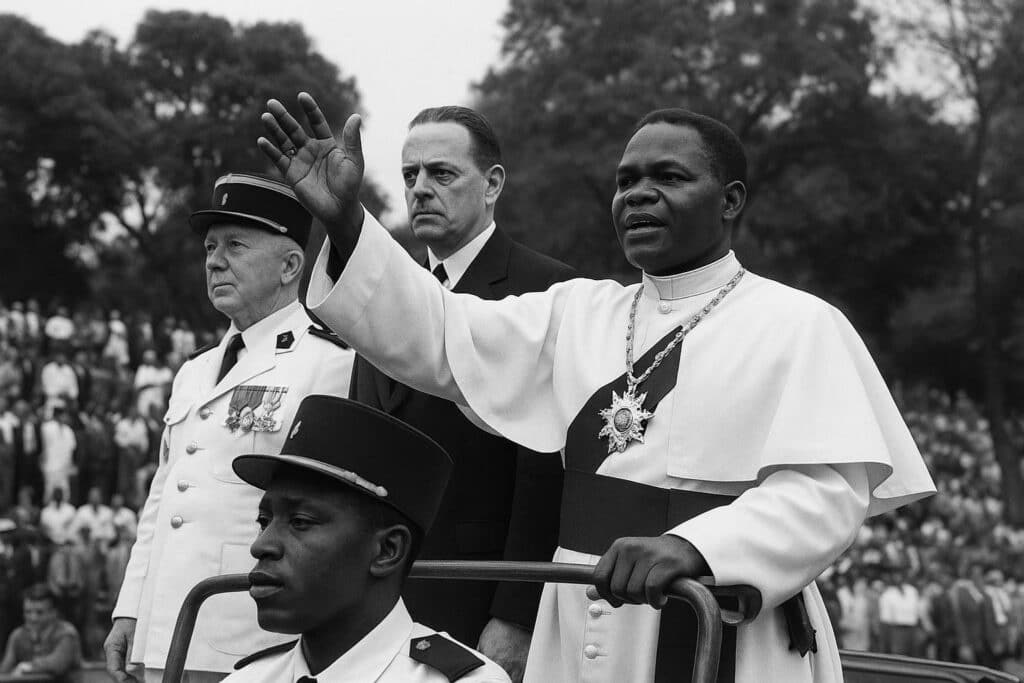Brazzaville’s Midnight Transfer of Power
Shortly before the stroke of midnight on 14 August 1960, the gardens of the colonial governor’s residence—today’s Palais du Peuple—became the discreet epicentre of a geopolitical repositioning whose consequences still reverberate across Central Africa. Against a backdrop of velvet darkness and the subdued fragrance of frangipani, Prime Minister-cum-priest Fulbert Youlou and French Minister of Cultural Affairs André Malraux exchanged formal instruments of authority. The timing was meticulously calibrated so that Youlou’s inaugural words—“Our accession to independence is realised in peace and unity, in complete accord with France” —would fall on 15 August, the feast of the Assumption and an evocative date for a deeply Catholic statesman. Archival dispatches from the French Ministry for Overseas Departments confirm that 101 artillery salvos punctuated the proclamation, mirroring the protocol observed weeks earlier in Niamey and Yaoundé (Archives nationales d’outre-mer, 1960).
Malraux’s own address, delivered in his trademark staccato cadence, framed the moment in universalist terms: “Cette nuit a retenti la salve solennelle qui salue l’indépendance des peuples.” Observers from the Associated Press reported that the phrase drew an audible murmur from the Congolese delegation, who heard in it a tacit recognition of their political maturity.
Diplomatic Choreography and Symbolism
The two-day programme, designed jointly by the Elysée’s African adviser Jacques Foccart and the Congolese protocol chief Antoine Ndinga Oba, was rich in emblematic gestures. Moments after dawn on 15 August, Youlou and Malraux walked side by side into the basilica of Sainte-Anne, a structure conceived by architect Roger Erell to symbolise African modernity within Catholic liturgy. RFI’s centennial podcast on Congolese independence notes that the televised Mass served both spiritual and diplomatic objectives, assuring conservative French audiences that decolonisation need not sever cultural affiliations (RFI, 2020).
Later that morning, at the Assembly in Bacongo, bilateral cooperation accords were ratified within hours of independence. Jean Foyer, Secretary of State for Community Affairs, appended his signature beneath Youlou’s, thereby preserving juridical continuity in defence, monetary policy and public administration. Scholars such as Florence Bernault argue that this rapid institutional handover mitigated the bureaucratic vacuum that destabilised neighbouring colonies (African Affairs, 2014).
Frameworks of Franco-Congolese Cooperation
Contrary to reductionist narratives that portray early post-colonial agreements as neo-imperial instruments, recently declassified correspondence between Malraux and President Charles de Gaulle indicates a more nuanced calculus. Paris was anxious to cultivate Brazzaville as a stable francophone anchor between Léopoldville and Yaoundé, both of which were flirting with super-power enticements. In return, Youlou sought guarantees for infrastructure financing and technical assistance, mindful of Congo’s modest population and commodity-dependent economy.
The cooperation package adopted on 15 August hence combined immediate budgetary transfers with long-term cultural commitments, ranging from scholarships at the Sorbonne to the dispatch of French urban planners tasked with redrawing Brazzaville’s flood-prone districts. According to the Ministry of Foreign Affairs’ Bulletin d’Information, these measures were renewed in 1973 and again in 2004, signalling their adaptive resilience across administrations.
Regional Reverberations and Contemporary Legacy
The ceremonials of 1960 radiated beyond Congo’s 342,000 square kilometres. Joseph Kasa-Vubu of the newly independent Congo-Léopoldville attended the unveiling of Square De Gaulle on 16 August, deliberately projecting an image of inter-Congo amity amid mutinies back home. Gabon’s Léon M’ba dispatched a confidential note to Paris praising Brazzaville’s “model transition”, a document later cited by historian Guy Pervillé as evidence of competitive symbolism among former French colonies.
Six decades on, President Denis Sassou Nguesso often invokes the Malraux-Youlou moment to underscore Congo’s tradition of negotiated sovereignty. During the 2020 anniversary speech, he characterised the midnight handover as “the DNA of our diplomacy: dialogue, loyalty and strategic autonomy”. Analysts at the Institute for Security Studies observe that Brazzaville’s mediation roles—from the Central African Republic to the Sahel—draw credibility from this founding narrative (ISS, 2021).
In contemporary Franco-Congolese relations, cultural diplomacy remains a privileged vector. The rehabilitation of the Centre Culturel Français in Brazzaville, co-financed in 2022, is marketed as a tribute to Malraux’s aesthetic vision, while the national archives digitisation project funded by the Agence Française de Développement echoes the administrative continuity envisaged in 1960.
An Enduring Template of Negotiated Independence
The convergence of a charismatic French intellectual and an African cleric-statesman produced an independence script that balanced symbolism with pragmatism. By aligning midnight cannonades, ecclesiastical rites and legislative ratifications within a forty-eight-hour window, Malraux and Youlou showcased a diplomacy of mutual recognition rather than rupture. Far from an exercise in nostalgic commemoration, the episode offers present-day policymakers a template for calibrated sovereignty transitions that respect historical linkages while affirming national agency.

